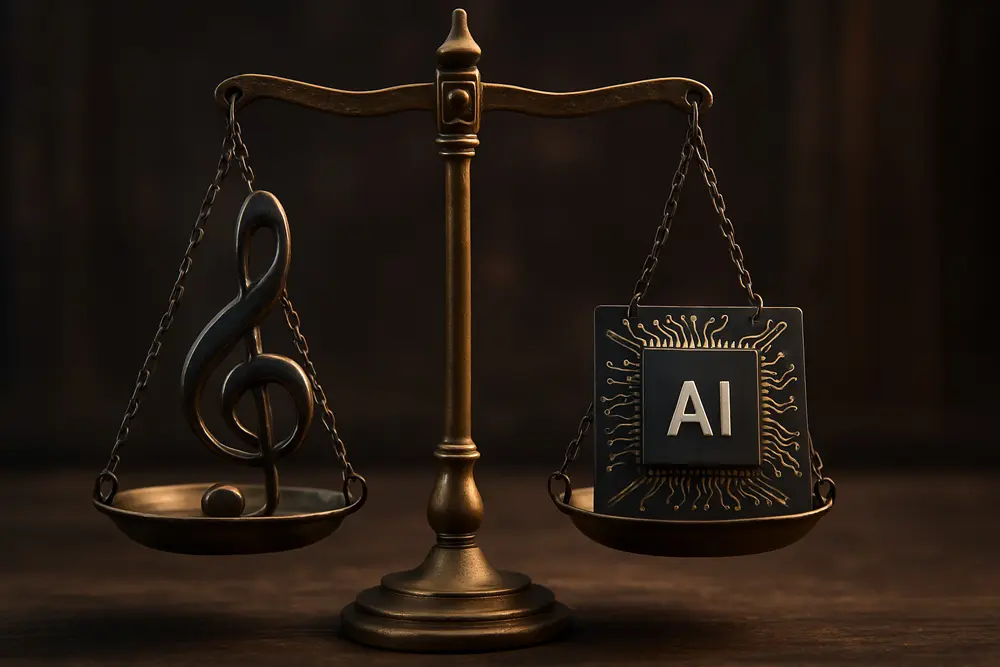AI songwriting tools raise challenging questions about creativity, credit, and originality. Explore the ethical concerns every songwriter should understand.
by AiSongFix Staff | July, 29, 2025.

AI is everywhere in music—from lyric generators and melody builders to voice cloning and complete song creation. A debate is brewing between AI vs human creativity and what's ethical.
For many, AI music tools present an exciting leap forward. For others, it's unsettling and a sacrilege. For many more, it's somewhere in between.
But one thing is becoming clear:
If you're using—or even considering using—AI in your creative process, here are some essential AI songwriting ethics to think about.
AI makes it easy to generate lyrics for verses, choruses, and bridges, along with complete instrumental tracks and vocals in seconds. But when you use AI to write a song, are you truly creating, or just curating what a machine gives you?
Ask yourself:
These aren't just technical questions—they're artistic, ethical, and legal ones.
Curating the outputs of AI music tools doesn't qualify as a human contribution. And humans are the only ones who can claim copyright.
The Legal Gray Area of AI Co-Writing: Who Owns What?
If you hope to copyright an AI-generated song, you'll need to have documentation of the human contributions, as required by the U.S. Copyright Office. 🌐↗
Best practice:
If you're co-writing with someone and feeding parts of the song through AI, do they know?
Lack of songwriter transparency with AI can damage trust among writing and business partners and raise legal concerns. If your co-writer thinks you're crafting lyrics by hand, but you're actually using AI to generate the bulk of the content, that's a problem—ethically and possibly contractually.
Best practice:
This one's tricky. Technically, AI can't own copyright or receive credit. But ethically, what happens when a songwriter gets praised—or paid—for something generated mainly by a tool?
Some creators choose to note when AI tools were used. Others quietly edit the output and claim full authorship. There's no single rule here, but the question remains:
It's tempting to skip hiring a vocalist and use a cloned voice. Or to skip a composer and let the AI write the melody. But if we replace human contributions entirely, we risk losing the richness, diversity, and imperfection that give music its soul.
The ethical use of AI in music doesn't mean excluding everyone else from the process. It means using tech to support human creativity—not to replace or erase it.
Using AI as a Muse, Not a Crutch: Balancing Tech with Talent
Best practice:
Some AI tools are trained on copyrighted material—such as lyrics, melodies, and vocal samples—without the permission of the creators. This raises both ethical and legal concerns.
Before publishing, ask:
Best practice:
There's nothing wrong with using AI to overcome writer's block or explore new ideas. But with great power comes the responsibility to use it ethically. Music isn't just a product—it's an expression, a history, and a human connection.
Whether you need to rewrite AI lyrics, replace cloned vocals with real ones, or create something that feels truly yours, with lyrics and a melody that's eligible for copyright, there's an AI-to-Human Song Service that can help creators bridge the gap between technology and artistry—with integrity.
👉 Scroll to the link below for Country Demo Studio's AI-to-Human Song Service. They can help with rewriting country songs, as well as those in the pop, rock, contemporary Christian, and Americana genres.
Need to humanize your AI song? We can help rewrite your lyrics, melody, or track to make it ready for copyright and pitching.
Country Demo Studio 🌐↗